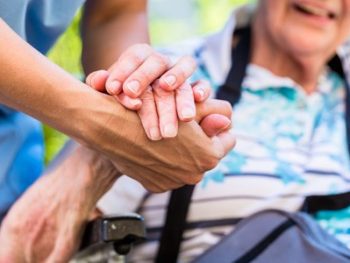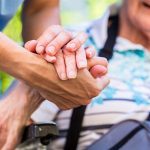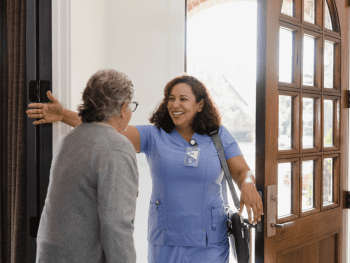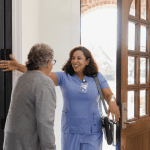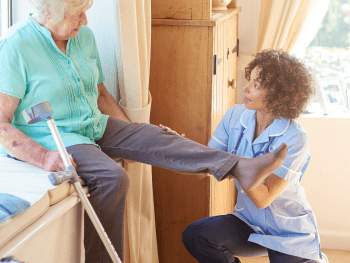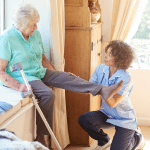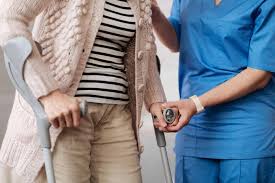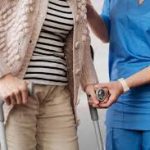According to the Centers for Disease Control and Prevention, seniors are more susceptible to heat-related illnesses and injury. When we age, our bodies become less efficient at regulating temperature because older adults do not sweat as much as younger adults, and sweat is the body’s most important heat-regulating mechanism. Older adults also store fat differently, which can further complicate heat regulation in the body.
This can cause issues in the summer because when the outside temperature rises, so does the body’s internal temperature. Which is why seniors suffer from heat stroke in the summer more often than younger people.
Therefore, seniors have health risks that need to be monitored, especially in the heat of the summer. Below are tips to keep seniors safe and healthy in the rising temperatures of the summer months.
Stay hydrated.
Drink eight or more glasses of water and/or fruit juices every day to stay hydrated. Avoid alcoholic and caffeinated beverages such as soda, coffee and tea as they can leave you dehydrated quickly. Increase your intake if you are doing any physical activity or if the weather is particularly hot.
Stay indoors during extreme heat.
In extreme heat and high humidity, evaporation slows down and the body must work extra hard to maintain a normal temperature. Keep in mind, the sun is the most intense between 10 am and 4 pm. If you can, limit your outdoor activity to the morning and the evening.
Stay in an air-conditioned place.
 Air-conditioning is important when it is hot and humid outside. If you do not have air-conditioning in your home, go somewhere that does. A movie theater, the mall, a friend or family member’s home or a community senior center are all good options. You can contact your local Area Agency on Aging for help finding a local cooling center during extended periods of extreme heat.
Air-conditioning is important when it is hot and humid outside. If you do not have air-conditioning in your home, go somewhere that does. A movie theater, the mall, a friend or family member’s home or a community senior center are all good options. You can contact your local Area Agency on Aging for help finding a local cooling center during extended periods of extreme heat.
Know the weather forecast and dress appropriately.
The best clothing to wear in the summertime is loose-fitting and lightweight clothes in natural, breathable fabrics like cotton. Dress in light colors that will reflect the sun and heat instead of darker colors that will attract them.
Protect your skin and eyes. 
Wearing sunglasses can block your eyes from harmful UV rays and protect your vision. When outdoors, protect your skin from damage by wearing hats, sunglasses and a sunscreen of SPF 30 or higher and that protects against both UVA and UVB radiation.
Know the side effects of your prescriptions.
Some medications can cause increased sensitivity to the sun. Look over your medications and talk with your doctor about any concerns or questions you have.
Know the early signs of heat-related illnesses such as dehydration, heat stroke, heat exhaustion, hyperthermia, etc.
 Signs to look for may include disorientation, dry skin, excessive tiredness, headache, lethargy, nausea, a flushed face, high body temperature, rapid pulse, dizziness and confusion. Take immediate action if you feel any symptoms coming on.
Signs to look for may include disorientation, dry skin, excessive tiredness, headache, lethargy, nausea, a flushed face, high body temperature, rapid pulse, dizziness and confusion. Take immediate action if you feel any symptoms coming on.
Maintain communication with friends, family, caregivers and emergency contacts.
Prepare a list of emergency phone numbers and place them in an easy-to-access area in case needed.
As a caregiver or loved one, you can help seniors beat the heat by:
- Visiting at least twice a day.
- Watching for signs of heat exhaustion or heat stroke.
- Making sure they have access to air conditioning.
- Helping them limit their exposure to the sun.
- Making sure they are getting enough fluids to keep them hydrated and have a normal body temperature.
Pemi-Baker’s Ask-A-Nurse: A collaboration with the Grafton County Senior Citizens Council (GCSCC)
If you have questions or need a place to cool off why not visit your local senior center? In addition to virtual and in-person activities and meals offered by the 8 senior centers of GCSCC, three are hosting Pemi-Baker Hospice and Home Health’s ‘Ask-A-Nurse’ program. This is a free service manned by a Pemi-Baker Registered Nurse and/or Social Worker where you can get your blood pressure checked, ask medical questions, fill our your advance directive forms or just swing by and say hi!
Ask-A-Nurse Days & Times:
Mondays 11:30-1pm @ Plymouth Regional Senior Center-8 Depot Street, Plymouth
Wednesdays 11:30-1pm @ Lin-wood Area Services- 194 Pollard Road, Lincoln
Every Third Thursday 11:30-12:30 @ Littleton Area Senior Center- 77 Riverglen Lane, Littleton
With over 55 years of experience, serving clients from 29 towns in central and northern New Hampshire, Pemi-Baker Hospice & Home Health is committed to creating healthier communities. Services include at-home healthcare (VNA), hospice and palliative care, and Community Programs including: American Red Cross CPR/AED/FA, Caregiver Support Groups and Grief and Bereavement Support Groups. Providing compassionate care with experienced staff who are trained, certified professionals in the business because of their hearts. In your time of need, we’re right where you need us.
Pemi-Baker is located at 101 Boulder Point Drive, Suite 3, Plymouth, NH. To contact us please call: 603-536-2232 or email: info@pbhha.org Like our Facebook Page: @pemibakerhospicehomehealth


 Free Summer Support Groups Offered by Pemi-Baker Hospice & Home Health
Free Summer Support Groups Offered by Pemi-Baker Hospice & Home Health
